- Home
- Genre-Based Pedagogy
- Bilingual Proficiency study
- Complexity Study
- Team
- All Project Presentations
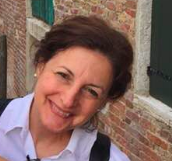 Alberta Gatti, Project Director
Alberta Gatti, Project Director
Alberta Gatti’s research interests include the areas of literature, literacy, and applied linguistics. In the past, she has worked on Spanish satire of early modern Spain, and more recently she has begun investigating the writing proficiency development of heritage language learners. Currently, her two fields of expertise are converging as she explores the development of critical literacy in the context of college education. Dr. Gatti is also an experienced higher education administrator, being the director of the Institute for Language Education in Transcultural Context (ILETC), a research and resource center for language education at the City University of New York (CUNY). She also directs the Center for Integrated Language Communities (CILC), a National Language Resource Center focusing on the teaching and learning of languages in the context of minority serving institutions and community colleges. Before CILC, she was the director of a multi-year, university-wide Title III initiative at Saint Xavier University in Chicago (SXU). The initiative included projects in three areas: student interventions, technology integration into instruction, and community-based and collaborative learning initiatives. At SXU, she also directed the Foreign Languages Program. Dr. Gatti has a degree in classical studies from Universidad de Buenos Aires (Buenos Aires, Argentina), and a Ph.D. in Hispanic language and literatures from Boston University (Boston, MA).
 Syelle Graves, Project Assistant Director
Syelle Graves, Project Assistant Director
Syelle Graves is assistant director of ILETC, and a linguist and educator. Her teaching experience at CUNY includes courses in linguistics, writing, reading, English as a second language (ESL), undergraduate research methods in corpus linguistics, and public speaking; at Hunter College, Brooklyn College, and LaGuardia Community College. Her research is focused on sociolinguistics, including language attitudes and rapid language change. She was an Enhanced Chancellor’s Fellowship recipient (2009-2014) and an Advanced Research Collaborative (ARC) Praxis recipient (2014), both at the Graduate Center. As a two-time CUNY Writing Fellow, she supported faculty in implementing Writing to Learn pedagogies in 2014 and 2016. She has additional experience working for the MLA (Modern Language Association), and for ETS (the Educational Testing Service) as a certified TOEIC rater. In 2019, she was honored with a SUNY New Paltz 40 Under Forty Alumni award. She holds a Ph.D. in linguistics from the Graduate Center, CUNY, and a B.A. in French from SUNY, and also supports faculty and students at BMCC’s OpenLab.
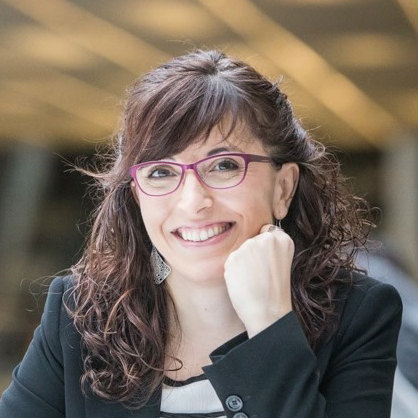 Aída Martinez-Gomez, John Jay College Research Partner
Aída Martinez-Gomez, John Jay College Research Partner
Aída Martínez-Gómez is an associate professor and coordinator for the B.A. in Spanish and the Certificate Program in Legal Translation and Interpreting at John Jay College. Her main research interests focus on interpreting in prison settings (including language policy and planning, treatment for foreign incarcerated offenders, and the particularities of bilingual prisoners acting as interpreters), non-professional interpreting and child language brokers, interpreting pedagogy for heritage learners, and interpreting quality assessment. Prof. Martínez-Gómez is certified as a Spanish interpreter by the New York State Unified Court System and as an English Sworn translator and interpreter by the Spanish Ministry of Foreign Affairs. She has worked in this capacity for the Spanish Secretary General for Correctional Institutions, the British Ministry of Justice, and several international law firms. She also collaborates pro-bono as an interpreter and interpreter trainer with several non-profit organizations in New York City (New Sanctuary Coalition, Her Justice). She holds a Ph.D. in translation and interpreting studies from the University of Alicante.
 María Julia Rossi, John Jay College Research Partner
María Julia Rossi, John Jay College Research Partner
María Julia Rossi is an assistant professor in the Department of Modern Languages and Literatures at John Jay College. Her monograph Ficciones de emancipación. Los sirvientes literarios de Silvina Ocampo, Elena Garro y Clarice Lispector (Beatriz Viterbo, 2020) explores representations of domestic servants and the emotional economy of relationships in literary works by these Latin American writers. She has also published peer-reviewed articles in journals such as Revista Iberoamericana, Revista Canadiense de Estudios Hispánicos, Hispamérica, Nueva Revista de Filología Hispánica, and Variaciones Borges. Her current research project is preliminarily titled “Not So Foreign: Translating Queer Desires in Latin America” and lies at the intersection of queer studies and translation studies. María Julia Rossi obtained her B.A.s at the Universidad Nacional de Rosario and Escuela Nacional de Teatro y Títeres, in Rosario, Argentina, and her Ph.D. and M.A. at the University of Pittsburgh.
 Elvira Swender, Project Consultant
Elvira Swender, Project Consultant
Elvira Swender is a specialist in proficiency-based language instruction and assessment, with extensive experience overseeing a number of programs and projects that serve the sole purpose of improving language teaching and testing. Dr. Swender is also a consultant to various U.S. and international educational, private sector, and governmental organizations and agencies. From 1997 to 2016, she served as the Director of Professional Programs at ACTFL. Current areas of research include correlations and concordances among testing scales and frameworks, including the ACTFL Guidelines, the U.S. Government’s Interagency Language Roundtable (ILR) Scale, the Common European Framework of Reference (CEFR), and the STANAG 6001 (NATO scale). She holds a degree in foreign language education and a Ph.D. in specialization in second language acquisition, Spanish language and culture, and educational administration from Syracuse University.
 Adrienne Brandenburg, Project Consultant
Adrienne Brandenburg, Project Consultant
Adrienne Brandenburg holds a Masters in Spanish and a Masters in teaching English as a second/foreign language from Colorado State University. She teaches various levels of Spanish and Spanish for heritage speakers at a large public high school in northern Colorado. She presents regularly at state and national conferences on topics related to heritage language teaching and literacy and serves as the Chair of the Spanish for Heritage Learners Special Interest Group at ACTFL. She is passionate about deepening connections among heritage teachers and preventing burnout for teachers in this unique area of world language teaching. Finally, she is committed to the lifelong work of recognizing and dismantling systems of oppression, in herself, her classroom, and her community.

Tomonori Nagano, Japanese Consultant
Tomonori Nagano is an associate professor of Japanese and linguistics. His research interests are second language acquisition and Japanese as a heritage language. Dr. Nagano’s articles have been published in various linguistics/applied linguistics journals such as Linguistic Approaches to Bilingualism, TheModern Language Journal, and Foreign Language Annals (See https://www.t-nagano.com/publications/ [t-nagano.com] for his publication list). He is a recipient of the Advanced Research Collaborative (ARC) award from the Graduate Center in 2019-2020. He is a certified tester and rater for ACTFL’s OPI and AAPPL (Japanese) and is currently serving as an executive board member for the Association of Departments of Foreign Languages (ADFL) at the MLA. He received his Ph.D. and M.Phil. in linguistics from the Graduate Center, CUNY and his M.A. in TESOL from New York University.
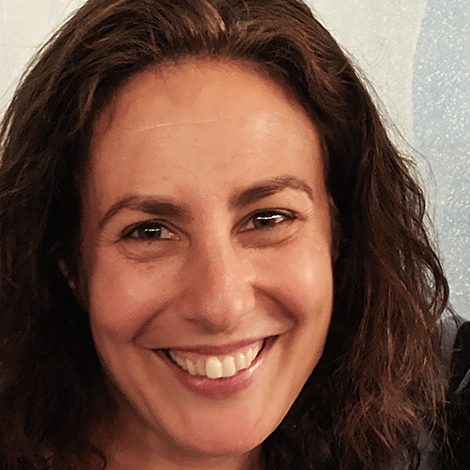
Maayan Barkan, Japanese Consultant
Maayan Barkan is the director of the Japanese program at Hunter College, where she has been teaching Japanese language courses since 2007. Dr. Barkan’s teaching and research focuses on Japanese language education, teaching and learning design, and pragmatic strategies for language learning. Her most recent publication is The Important Role of Pragmatic Strategies in L2 Japanese Teaching and Learning, published in the proceedings of the 24th Princeton Japanese Pedagogy Forum (PJPF) in 2018, and her most recent presentation is Experimental Design: Methods for Investigating Main-Clause Omission in Japanese and Hebrew, a paper presented at the International Pragmatic Association Conference in Hong Kong in 2019. She holds a Ph.D. in linguistics from the Graduate Center, CUNY.
 Daniela Castillo, Research Assistant
Daniela Castillo, Research Assistant
Daniela Castillo is a level II Ph.D. student in linguistics at the Graduate Center, CUNY who has been working as a research assistant in the Multilingual Literacy SIFE (Students with Interrupted/Inconsistent Formal Education) Screener developed in the Second Language Acquisition Lab at the Graduate Center. For the past two years, Daniela has been teaching a linguistics course in the English department at Hunter College and also has experience teaching English as a foreign language in Argentina as well as Spanish as a foreign language in the U.S. Her research interests comprise different aspects of bilingualism including speech perception and code-switching. Daniela was the recipient of an NSF Research Experience for Undergraduates Fellowship in 2017-2018 and currently holds a Provost’s Enhancement Fellowship (2018-2023). Daniela received her B.A. with majors in general linguistics and communication sciences and disorders from Queens College, CUNY.
 Aránzazu Borrachero Mendívil, Research Partner
Aránzazu Borrachero Mendívil, Research Partner
Aránzazu Borrachero Mendívil is a professor at Queensborough Community College (CUNY), and has a Ph.D. in Hispanic and Luso-Brazilian literatures from the Graduate Center (CUNY). Her areas of interest include critical pedagogy and Spanish cultural and gender studies. She has published numerous articles in the area of feminist literary criticism and two books: a critical and annotated edition of the poetry of 17th-century writer Catalina Clara Ramírez de Guzmán in collaboration with Karl McLaughlin (Obra poética, Editora Regional de Extremadura, 2010); and a theoretical analysis entitled Ética y estética en la narrativa femenina hispanoamericana contemporánea (Pliegos, 2011). Since 2012, she has been working on a digital platform, Mujer y Memoria, designed to house oral history projects with a gender perspective. The first one, entitled “Madres e hijas de la transición democrática,” documents, through audiovisual recordings and life stories, the experiences of women who became adults and mothers during the Francoist dictatorship. She is currently working on her second Mujer y Memoria project: “Maternidades robadas,” which collects and divulges the testimonies of victims of the “stolen babies” crime in Spain.

Sara Lopez-Stoelting, Research Partner
Sara Lopez-Stoelting grew up between Cáceres, Spain, and Sac City, Iowa in a bilingual family. She received a B.A. in translation and interpreting and an M.A. in bilingual education from the Universidad Pablo de Olavide (Seville, Spain) and is currently enrolled in their Ph.D. Program in applied linguistics. Her research is centered on dispositions towards bilingualism among pre-service teachers. Her research interests include linguistic identity, language attitudes, multilingualism and translanguaging. After spending more than a decade teaching languages in Spain (English, Spanish and German), she relocated to New York in 2021 . During that year, she received an invitation from the Institute for Language Education in Transcultural Context (ILETC) to focus on her research remotely. She currently teaches AP Spanish and culture courses to high school students at various levels.
 Rocío Carranza Brito, Research Assistant
Rocío Carranza Brito, Research Assistant
Rocío Carranza Brito is a Ph.D. candidate in Hispanic sociolinguistics in the Latin American, Iberian, and Latino Cultures program at the Graduate Center, CUNY. In her dissertation, she explores how Mexican immigrants in New York use language representations and ideologies to position themselves in the job market and to make decisions on the language education of the next generation. Rocío has taught Spanish at all levels and as a heritage language in most of CUNY campuses. She has also collaborated on several research projects at CUNY, such as translator and research assistant in CUNY-IIE, the initiative in immigration and education, and research assistant in the Investigating Pedagogies for Advanced Proficiency (IPAP). Her research interests comprise language and dialect contact, language ideologies, and the intersection between language, migration, and labor.
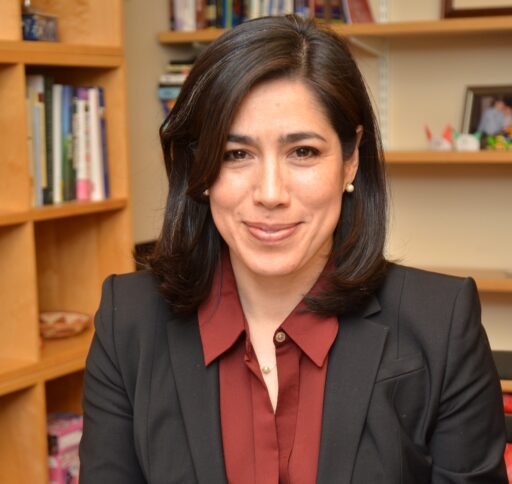 María Luisa Parra-Velasco, Project Consultant
María Luisa Parra-Velasco, Project Consultant
María Luisa Parra-Velasco is senior preceptor at the Department of Romance Languages and Literatures (RLL) at Harvard University. She has a Ph.D. in Hispanic linguistics from El Colegio de México. Her work focuses on pedagogy for Spanish as a heritage language, identity theory, and U.S.-Mexico transnational education. She directs the RLL’s Initiative on Teaching Spanish as a Heritage Language, and partners with Harvard Art Museums and non-profit organizations to provide students with transformative learning experiences. Finally, she works closely with Spanish college and high school teachers in the Boston area and in Mexico providing them with professional development to teach Spanish to Latinx students at both sides of the border. In 2019, Parra-Velasco received the Babson University Award Most Innovative Professors for her interdisciplinary, creative and cutting-edge work. Her book Enseñanza del español y juventud Latina was published in 2021 (Editorial Arco Libros).
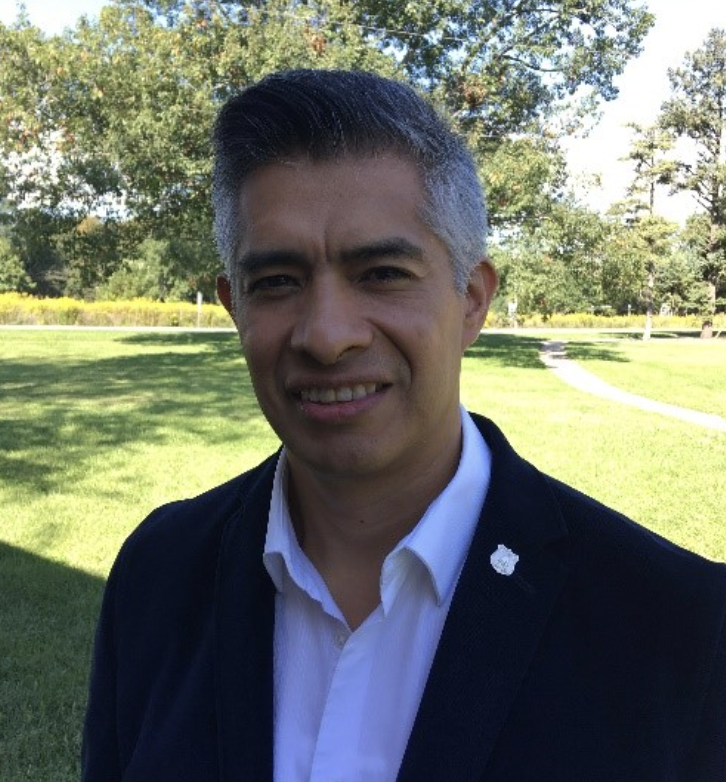 Adrián Bello-Uriarte, Project Consultant
Adrián Bello-Uriarte, Project Consultant
Adrián Bello-Uriarte is a full-time lecturer of Spanish at Butler University in Indianapolis, where he teaches courses in language and linguistics. At Butler, he developed the first course of Spanish for Heritage Speakers and a course of Sociolinguistics. He is also the advisor of Latinx Students Organization. He completed a Ph.D. in Spanish linguistics, an M.A. in Spanish and an M.A. in English as a second language at the University of Illinois at Urbana-Champaign. His dissertation focused on the effects of instruction on the writing of heritage learners of Spanish using measures of syntactic and lexical complexity. He has published his work in two edited books: Evidenced-Based Second Language Pedagogy (Sato & Loewen, 2019) and Outcomes of University Spanish Heritage Language Instruction (Bowles, 2022). His research interests also include the preservation of indigenous languages in Mexico, which is where he is from.
 Shinji Kawamitsu, Project Consultant
Shinji Kawamitsu, Project Consultant
Shinji Kawamitsu is an assistant professor at Kansai Gaidai University in Osaka, Japan. His research interests include systemic functional linguistics (SFL), SFL-informed language teaching and teacher education, critical literacy, and critical discourse analysis. Currently, with the support of the JSPS Grant-in-Aid for Early-Career Scientists (2021-2024), he is developing a workshop aimed at enhancing pre-service Japanese language teachers’ understanding of writing and instruction from an SFL perspective. Shinji Kawamitsu holds a Ph.D. in language, literacy, and culture from the University of Massachusetts Amherst.
 William Oliver, Research Assistant
William Oliver, Research Assistant
William Oliver is a Ph.D. student in linguistics at SUNY Stony Brook. He holds a B.A. in philosophy from SUNY Binghamton, an Ed.M. in language and literacy from Harvard University, and an M.A. in computational linguistics from CUNY Graduate Center. He also is an adjunct professor in the City College School of Education in its Programs for Bilingual Education and TESOL where he teaches ESL pedagogy and linguistics. Before joining ILETC, William taught high school English and ESL in Arizona public schools.



